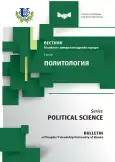№ 2 (2016)
- Жылы: 2016
- Мақалалар: 10
- URL: https://medbiosci.ru/2313-1438/issue/view/23013
- DOI: https://doi.org/10.22363/2313-1438-2016-2
Бүкіл шығарылым
ARTICLES
Russia and Israel in Syrian Crisis
Аннотация
The article deals with the main aspects of cooperation between Russia and Israel during Russian military operation in Syria. The author argues that in modern realities there was a rapprochement of Russia's and Israel’s national interests as both nations were equally interested in preventing the strengthening of the terrorist organization “Islamic state” and the stabilization of the situation in the region as a whole. The leaders of Russia and Israel have managed to find a common language, and in the moment two countries have established close cooperation during the military operation in Syria by Russian air-space force. However, the author predicts that in the short term both parties will have to make mutual concessions to maintain their favorable relations.
 7-14
7-14


Security Problems in the Caspian Region in the Context of the New Geopolitical Situation
Аннотация
The article investigates the problem of security in the Caspian region in the conditions of current geopolitical reality. Author highlights the factors that change the situation in the world and activating the geopolitical interests of a number of states in the Caspian region: “color revolutions” in the Arab countries, the Syrian conflict, the aggravation of relations between the US and Iran, the aggravation of relations between Turkey and Russia etc. In the article author defines the risks of destabilization of the situation in the Caspian region as a function of each of these factors, and formulate proposals on the collective security of the Caspian states.
 15-24
15-24


Understanding Dominance of the Justice and Development Party in Turkey: the Ideological Dimension
Аннотация
The article examines the ideological dimension of dominance of the Justice and Development Party in the Turkish political process. Analysis of the party's doctrine and its leaders’ statements reveals the pivotal elements of the ideology that facilitated strengthening of the JDP's stance as a dominant party, i.e. liberal and democratic values, social conservatism, modernism, globalism and Neo-Ottomanism. These center-right orientations, being vague and eclectic, helped “democratic Islamists” to show both ideological rigidity and flexibility necessary to mobilize broad masses of Turkish voters and to keep long-term public support.
 25-38
25-38


Media Technologies and Their Role in the Information Warfare
Аннотация
The article analyzes the new role of the mass media in the modern information space, the basic techniques and technologies of focused preparation, semantic distortion and emotional coloring of the transmitted information. The value of the mass media is estimated as the main weapon of the information warfare in the modern geopolitical space. Specific examples and techniques for manipulating information.
 39-52
39-52


Objective and Subjective Factors of Perception of Russia’s Image in the EU
Аннотация
The article examines the role of international environment influencing the image of Russia. The author reveals the psychological mechanisms of perception of the image of Russia in the EU. Considerable attention is paid to the analysis of objective and subjective factors constructive and negative perception of Russia and its political leader. Status conflicts are analyzed in the article as well, including methods and techniques of purposeful distortion of the image of Russia in Europe.
 53-60
53-60


The Search of Russian National Branding Idea Under the Logic of Formation of a Multipolar Global World
Аннотация
The article is devoted to the analysis of methodological fundamentals of national brand strategy forming on the identity base. A communicative branding model should have a basis as a central theme, which has a significant value for the citizens and for the international actors. The author states that the Russian national brand identity is defined by the key idea of the strong defensible state. Therefore, defense industry can be object field for national branding strategy forming. As a result branding communication may become a national unity basis and an effective state positioning.
 61-69
61-69


The Peculiarities of Professional Morality of the Political Professionals
Аннотация
The article presents the characteristics of those professionals who make political careers (politicians, mediators, experts, political technologists, speechwriters, image-makers, etc.). The peculiarities of their professional activity are based on their multifaceted roles as the actors who construct a new social reality. The specificity of the professional morality and actualized norms of professional morality of policy-makers are analyzed in the given article.
 70-76
70-76


The Problem of Classification of NGOs
Аннотация
Over the last few decades, non-governmental organizations intensively act as a relatively independent party in internal and external affairs of different countries and international relations in general. Almost all socio-political and international law issues are solved, in particular, under their direct or indirect influence of NGOs. Some NGOs have more influence in the world than a single state or a group of states. This situation requires more attention to NGOs, detailed study of their activities and position in globalized society.
 77-86
77-86


«Within Sanction Regime»: Problems and Perspectives of Russian Economic and Political Development. The Papers of the “Round Table” of the Lecturers and Students of the Peoples’ Friendship University of Russia
Аннотация
The paper comprises the materials of the “round-table” “Within sanctions regime: problems and perspectives of Russian economic and political development” which was organized by the chair of the comparative politics of the Peoples` Friendship University of Russia (PFUR) and took place on February 20. 2016 on the faculty of the humanities and social sciences. Among the questions discussed within the “round table” were economic and political aftermaths of the sanctions imposed on Russia by the West and Russian countersanctions against the EU, USA and the further perspectives of Russian economic and political development, cooperation with the West. Among the participants of the “round-table” were the lecturers and the students of the political department of the PFUR, the students of the faculty of applied political sciences of the National Research University of Higher School of Economics as well as political experts.
 87-126
87-126


On Our Authors
 127-128
127-128











